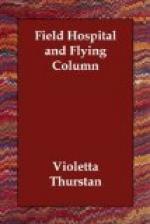We were now officially transferred from the hospital to the Flying Column, of which Prince V. was the head. A flying column works directly under the head of the Red Cross, and is supposed to go anywhere and do anything at any hour of the day or night. Our Column consisted of five automobiles that conveyed us and all our equipment to the place where we were to work, and then were engaged in fetching in wounded, and taking them on to the field hospital or ambulance train. The staff consisted of Prince and Princess V., we two English Sisters, with generally, but not always, some Russian ones in addition, an English surgeon, Colonel S., some Russian dressers and students, and some sanitars, or orderlies. The luggage was a dreadful problem, and the Prince always groaned at the amount we would take with us, but we could not reduce it, as we had to carry big cases of cotton-wool, bandages and dressings, anaesthetics, field sterilizer, operating-theatre equipment, and a certain amount of stores—such as soap, candles, benzine and tinned food—as the column would have been quite useless if it had not been to a large extent self-supporting. Our Column was attached to the Second Army, which operated on the eastern front of Warsaw. The Russian front changes so much more rapidly than the Anglo-French front, where progress is reckoned in metres, that these mobile columns are a great feature of ambulance work here. Our front changed many miles in a week sometimes, so that units that can move anywhere at an hour’s notice are very useful. The big base hospitals cannot quite fulfil the same need on such a rapidly changing front.
VIII
THE BOMBARDMENT OF LODZ
It took us a long time to get to Lodz, though it is not much more than 200 kilometres away. Russian roads are villainously bad anyhow, and the Germans, though their retreat had been hasty, had had time to destroy the roads and bridges as they went. Another thing that delayed us were the enormous reinforcements of troops going up from Warsaw to the front. It was very interesting to watch the different groups as we passed, first a Cossack regiment going up, then an immense convoy followed with about 200 wagons of forage. Just ahead of that we passed the remounts—sturdy, shaggy Siberian ponies. They are the most delightful creatures in the world, as tame as a dog, and not much bigger, and many of them of a most unusual and beautiful shade of golden cream. They have been brought from Siberia by the thousand, and most of the little things had never seen a motor-car before, and pranced and kicked and jumped, and went through all kinds of circus tricks as we passed.
[Illustration: MAP OF THE POLISH FRONT]
As we grew nearer to Lodz it was sad to see a good many dead horses lying by the roadside, mostly killed by shell-fire. The shells had made great holes in the road too, and the last part of our journey was like a ride on a switchback railway. It began to get dark as we came to Breeziny, where a large number of Russian batteries were stationed. It looked very jolly there, these large camps of men and horses having their supper by the light of a camp-fire, with only the distant rumble of the guns to remind them that they were at war. Two hours later we jolted into the streets of Lodz.




